|
|
|
Sort Order |
|
|
|
Items / Page
|
|
|
|
|
|
|
| Srl | Item |
| 1 |
ID:
146234
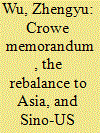

|
|
|
|
|
| Summary/Abstract |
Many contemporary academics and policy analysts have revisited the Anglo-German rivalry before 1914 to predict what may await China and the United States in the twenty-first century. However, few, if indeed any, have specified in what sense this comparison can be made. This paper attempts to fill this gap with a detailed analysis of the strategic parallels between the Anglo-German rivalry then and the China–US competition now through the lens of the Crowe Memorandum. The author argues that the basic parallel between the rise of Germany and the rise of China lies in the challenges they posed or pose to the dominant maritime power and system leader – Great Britain then and the United States today. This parallel also explains the similarity between the Triple Entente initiated by Great Britain prior to 1914 and the Rebalance to Asia launched by the United States in 2011. Furthermore, as in the case of the Anglo-German rivalry before 1914, the most crucial problem underlying the mounting China–US competition in recent years has been America’s deepening apprehension about the development of China’s anti-access/area-denial (A2/AD) and naval capabilities. This development, from the US perspective, is threatening to deprive the US of its most crucial instrument to influence the strategic equilibrium on the East Asian littorals. Based on the lessons of the Anglo-German rivalry prior to 1914, the essay also examines the potential for mitigating, if not eliminating, the mounting competition and misgivings between China and the United States.
|
|
|
|
|
|
|
|
|
|
|
|
|
|
|
|
| 2 |
ID:
140520
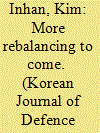

|
|
|
|
|
| Summary/Abstract |
For the past two years, the Asia-Pacific seems to have returned to the back seat in U.S. foreign policy priorities because of crises in Europe and the Middle East, and Washington’s own fiscal problems. Given both global and domestic developments, it is a legitimate question to ask whether the U.S. rebalance to the Asia-Pacific is still valid. This paper asserts, “Yes, it is.” Washington has made steady progress across military, diplomatic, and economic realms of the rebalancing. It has strengthened and expanded military ties with regional states and prepared for its naval forces to operate more intensively. It has become a member of major multilateral institutions and expanded support for appropriate organizations. And it is striving to complete the most important trade deal in a generation, the Trans-Pacific Partnership. Despite budget pressures, the Obama administration has kept the Asia-Pacific high on its foreign policy agenda, and the rebalance has enjoyed bipartisan support. While the high-profile rebalancing moves have been relatively modest so far, the Obama administration’s achievements should not be understated. More balancing effort is certain to come.
|
|
|
|
|
|
|
|
|
|
|
|
|
|
|
|
| 3 |
ID:
148441


|
|
|
|
|
| Summary/Abstract |
In April, I laid a wreath at the Manila American Cemetery, in the Philippines [1], where some 17,000 Americans are buried. Looking up at the mosaic maps of battles whose names still echo throughout the U.S. Department of Defense—Guadalcanal, Midway, Leyte Gulf, and more—it is hard not to appreciate the essential role that the U.S. military has long played in the Asia-Pacific. Many of the individuals buried in the cemetery helped win World War II [2]. For the people and nations of the region, they also won the opportunity to realize a brighter future.
|
|
|
|
|
|
|
|
|
|
|
|
|
|
|
|
| 4 |
ID:
154954


|
|
|
|
|
| Summary/Abstract |
Attempts to predict the future shape of President Donald Trump’s defence policy in the Asia-Pacific are a challenge, at best. Nevertheless, Patrick Cullen argues that, in contrast to early assumptions that he would initiate a more isolationist defence policy and break with the previous administration’s Rebalance to Asia policy, Trump is more likely to adopt a hawkish – if unpredictable – enforcement of the policy’s key defence objectives. Gauging whether the Trump administration will bring either change from, or continuity with, the military component of the Rebalance to Asia policy will require keeping an eye on each of the policy’s subcategories.
|
|
|
|
|
|
|
|
|
|
|
|
|
|
|
|
| 5 |
ID:
170112


|
|
|
|
|
| Summary/Abstract |
Following the collapse of diplomatic negotiations with North Korea in 2012, the Obama administration settled on a policy approach dubbed "strategic patience." That policy involved the gradually escalating application of nonviolent means of coercion as the North Korean nuclear problem that it purported to arrest grew more acute over time. But what led the Obama administration to adopt this confrontational yet timid approach to North Korea? Using a configurational analysis, this article proposes that the Obama-era policy of "strategic patience" had little to do with North Korea per se, and instead derived primarily from the intersection of three different factors: the prioritizations necessary as part of the US "rebalance to Asia" strategy; fear that South Korean aggression would pull the United States into an unwanted war in Korea; and a prevailing belief among many policymakers that the North Korean regime would eventually collapse under the pressures of its own contradictions. This combination of priorities and beliefs led the Obama administration to treat the North Korean nuclear issue seriously but not urgently, resorting to actions incommensurate with the nature of the problem.
|
|
|
|
|
|
|
|
|
|
|
|
|
|
|
|
| 6 |
ID:
146233
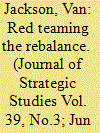

|
|
|
|
|
| Summary/Abstract |
What specific forms of reasoning underlie the US approach to Asia, what downside risks do they imply, and to what extent can they be mitigated? This article examines the theoretical underpinnings of the US “rebalance” to Asia by categorizing US policies according to three types of logic: military power; economic liberalism; and institutionalism. It then uses international relations theory as a diagnostic tool to assess risks in these approaches. Recent efforts toward improving transparency in contested maritime areas and capacity-building of local allies and partners may address the strategy’s most acute risks, while inevitably generating more in the process.
|
|
|
|
|
|
|
|
|
|
|
|
|
|
|
|
| 7 |
ID:
142989


|
|
|
|
|
| Summary/Abstract |
In November 2011, President Barack Obama announced that the United States would rebalance to the Asia–Pacific region. Although this shift had been underway for years, experts across the Pacific generally welcomed Washington's increased attention. From the beginning, however, the U.S. Congress and governments in Asia have questioned whether the rebalance announcement was backed by the necessary resources and implementation strategy.
|
|
|
|
|
|
|
|
|
|
|
|
|
|
|
|
| 8 |
ID:
147399


|
|
|
|
|
| Summary/Abstract |
Between the American rebalance strategy and Chinese Maritime Silk Road initiative, India is increasingly pressed to formulate a maritime strategy that ideally meets Indian economic and strategic objectives. This is generating major policy dilemmas for India stemming from the attraction of economic integration led by China on the one hand, versus the attraction of strategic integration offered by the United States on the other hand. This paper suggests that between these binary options, there are both opportunities and challenges for India, calling for fine-grained policymaking. The notional concept of an India–US–China maritime triangle is useful in sifting through the choices before India to meet its ambitions of development as well as retain and improve its strategic influence in the Indian Ocean and beyond.
|
|
|
|
|
|
|
|
|
|
|
|
|
|
|
|
| 9 |
ID:
113903
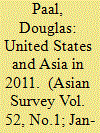

|
|
|
|
|
| Publication |
2012.
|
| Summary/Abstract |
The Obama administration moved to stabilize 2010's deteriorating relations with China and exploit the opportunity to deepen ties with China's nervous neighbors. Diplomatic, economic, and security initiatives were melded to "rebalance" American resources and attention to Asia in the 21st century. Early 2011 euphoria about China's rise and gloom about America's decline began to reverse themselves by end 2011. Obama made a key policy statement about the Asia-Pacific region in his address to Australia's Parliament.
|
|
|
|
|
|
|
|
|
|
|
|
|
|
|
|
| 10 |
ID:
138664
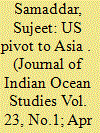

|
|
|
|
|
|
|
|